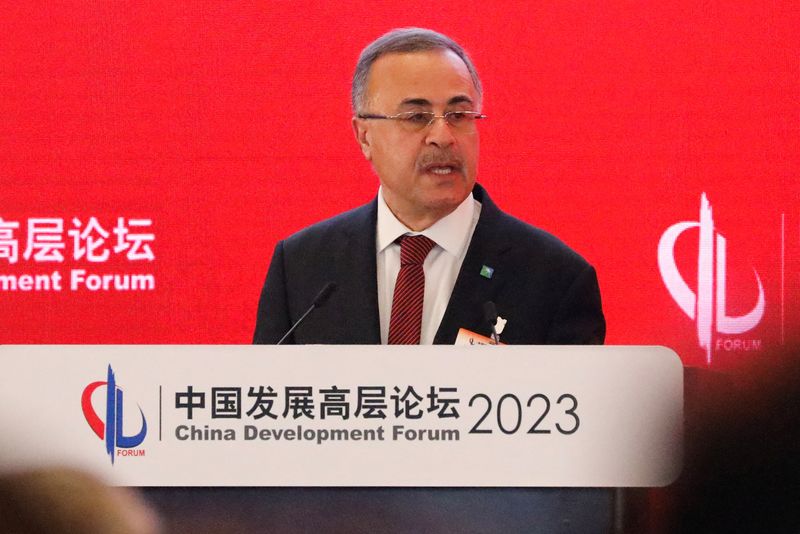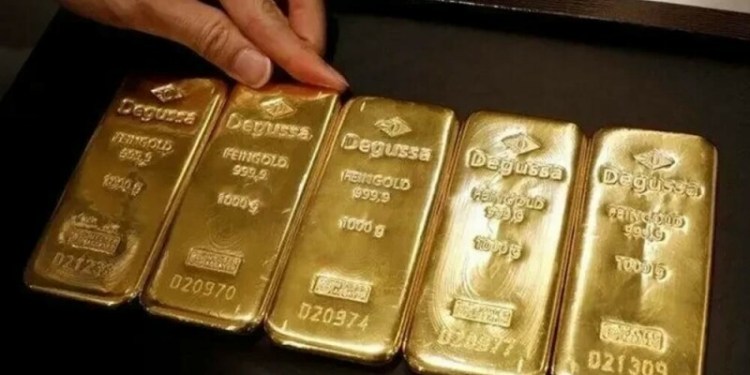
© Reuters. File photo: President and CEO of Aramco Amin Nasser speaks at China Development Forum 2023, in Beijing, China, on March 26, 2023. REUTERS/Jing Xu/File photo
2222
+1.42%
Add to/Remove from Watchlist
Add to Watchlist
Add Position
Position added successfully to:
Please name your holdings portfolio
Type:
BUY
SELL
Date:
Amount:
Price
Point Value:
Leverage:
1:1
1:10
1:25
1:50
1:100
1:200
1:400
1:500
1:1000
Commission:
Create New Watchlist
Create
Create a new holdings portfolio
Add
Create
+ Add another position
Close
By Maha El Dahan and Yousef Saba
DUBAI (Reuters) -Saudi Aramco (TADAWUL:2222) Chief Executive Amin Nasser said on Sunday the oil giant was looking at further opportunities to invest in China, where he said oil demand was robust and growing.
State-owned Aramco has been ramping up its China presence in a string of deals in refining and petrochemicals, some of them with crude offtake agreements attached.
“So far we are in the early part of 2024, demand is healthy and growing in China,” Nasser said on a media call following the release of results that showed net profit falling 24.7% to $121.3 billion on lower oil prices.
Nasser said the country’s refineries were some of the most fully integrated and had the highest conversion rates and Aramco was currently looking at further opportunities for investment.
Nasser expected the global oil market to remain healthy throughout 2024.
“We expect it to be fairly robust, we are looking at growth of about 1.5 million barrels,” Nasser said.
Nasser put demand for 2024 at 104 million barrels a day as opposed to an average of 102.4 million barrels in 2023.
The Saudi government in late January ordered Aramco to scrap its expansion plan to boost production capacity to 13 million barrels a day (mbpd), returning to the previous 12 mbpd target.
Two projects that were part of the expansion plan – Safaniyah and Manifa – are on hold, while three others are ongoing. Those are Zuluf, Marjan and Berri, expected to add 600,000, 300,000 and 250,000 barrels a day of crude production.
Nasser said maximum production capacity would be optimized to maintain it within the 12 million bpd target, despite the ongoing projects.
“I will manage that by moderating our decline, and offsetting that decline with the addition that will be coming from Zuluf, Marjan and Berri. That should not impact the number of rigs that we have in the field.”
The capacity target decision had sent shares of U.S. oilfield services providers tumbling as higher international and offshore oil exploration and produciton, primarily in the Middle East and Africa, had largely helped oilfield firms ride out slowing drilling activity by U.S. shale firms.
GAS, LNG AND LITHIUM
Aramco aims to grow its gas production by 60% by 2030 from 2021 levels.
Aramco may partner with MidOcean Energy, a company owned by U.S. investment firm EIG Partners, to invest in liquefied natural gas (LNG) projects outside of Australia, Nasser said, having agreed last year to take a strategic minority stake in MidOcean.
“We are partnering with MidOcean in Australia and we might partner with them in other enclaves depending on the opportunities,” he said.
Nasser also said Aramco was interested in investing in LNG opportunities in the U.S. but said he could not reveal further details.
“We are in discussion with a number of companies.”
The global LNG industry is booming and the U.S. is the world’s largest exporter.
Sources told Reuters last week Aramco is in talks to invest in phase 2 of Sempra Infrastructure’s Port Arthur LNG project in Texas, which represents a proposed expansion to the already producing first phase.
Discussions are also still ongoing for a tie-up with French carmaker Renault (EPA:RENA) and China’s Geely for a 15% to 20% stake in their joint-venture for combustion and hybrid engines, Nasser said.
Nasser also confirmed Aramco was currently evaluating the concentration of lithium in its oilfield brine.
Sources had told Reuters on Friday Aramco was at the early stages of work on lithium extraction, regarded as a critical mineral by many major economies because of its use in battery manufacture.
“This is a work in progress,” Nasser said.
Source: Investing.com

























